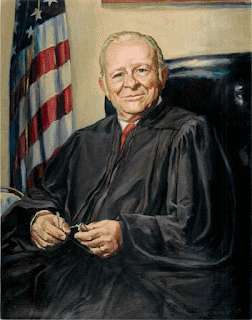Eleventh Circuit Judge James Hill passed away last Friday at 93. Here's the 11th Circuit's
memoriam page:

James Clinkscales Hill, a senior judge on the 11th Circuit Court of Appeals, died on March 31, 2017 in Stuart, FL. He was 93. Born in Darlington, SC on Jan. 8, 1924, Hill attended the University of South
Caro lina for three years before joining the Eighth Air Force in England during World War II, serving in the 390th Bomb Group as a cryptographer. After the war, he entered Emory University Law School,
graduating in 1948 and joining the Atlanta firm of Smythe Gambrell. He founded Hurt, Hill andRichardson in 1963 and worked primarily as a defense trial lawyer until he was appointed a federaldistrict judge in 1974 by President Richard Nixon. President Gerald Ford elevated Hill to what was then the Fifth Circuit in 1976. In 1946, he married Mary Black of Simpsonville, SC, then a chemist with the Food and Drug Administration who went on to a career dancing and teaching ballet in Atlanta. Mary and Jim were active in Atlanta's cultural, legal, political and social scene for the next 45 years. Many weekends were spent in their houseboat on Lake Lanier. Every April meant a trip to the Masters. World travelers, they went far beyond the usual tourist destinations -
climbing up Kilimanjaro, rafting down the Grand Canyon, trekking in the Himalayas, cruising on the Yangtze, sailing along the Nile --visiting everycontinent but Antarctica. For some years, Jim flew his own Beechcraft Bonanza and then learned to scuba dive. A dedicated golfer who played Augusta National and St. Andrews, he recorded three holes
in-one. Two of those came at the Golf Club of Amelia Island, FL where Jim and Mary moved in 1991 after he took senior status on the court, maintaining chambers in Jacksonville and living on the ocean. Jim,
who celebrated his 80th birthday with a parachute jump, heard cases until after his 90th. Among his many honors was membership in the American College of Trial Lawyers. In Atlanta, Jim and Mary were
members of Wieuca Road and Northside Drive Baptist Churches, joining the Amelia Plantation Chapelwhen they moved there. Services will be held there on Saturday, April 8 at 11 a.m. Jim's ashes will be
placed in the Chapel's columbarium next to those of Mary who died in 2010. He is survived by his sister Jean Ballentine of Mt. Pleasant, SC; his sons, James C. Hill, Jr. (Dorothy) of Stuart, FL, and A. Michael Hill
(Patty Dann) of Baltimore, MD; seven grandchildren and six great -grandchildren. Memorial contributions may be made to the Judge James C. Hill scholarship at Emory University Law School.


